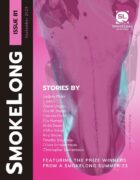How did you navigate braiding the creative with factual events?
The first draft of this piece was actually a poem, so at that point in the writing process I wasn’t too worried about distinguishing between the creative and factual events; poets are lucky in that they aren’t usually asked to sort between fact and fiction the same way prose writers are. Most of the material that made it into the final piece is factual, but some of that poetry-logic carried over as well.
I found myself laughing at some quite shocking events, like the attempted hit and run and the testicle attack. Can you talk about the use of humor in your work?
It’s interesting that those details made you laugh. I didn’t really intend for them to be funny, but now that I think about it, if I were reading this piece instead of writing it, I probably would have had a similar reaction. The ex-wife’s behavior is pretty absurd. Laughing at her seems healthier, in a way, than taking her too seriously.
Humor always seems to sneak its way into my work, even when I’m trying to be serious. This is the case in real life, too. Even when I’m angry, or sad, or exhausted, I feel the need to make little jokes about it, and thank goodness; humor makes misery bearable, sometimes, and I guess the main reason it found its way into this piece is that I wanted the reader to experience some pleasure along the way, despite the darkness of the material.
On another note, I wonder if there’s something inherently “funny” to some of us about a woman physically abusing a man; the scenario is so unexpected. I doubt many readers would laugh if this piece were about a woman who’d been abused by her ex-husband. Then again, maybe the humor comes from my way of telling the story rather than the subject matter. I’m not sure. Humor is a mysterious force, and it’s hard to read your own writing clearly.
The literary theorist Roland Barthes coined the word “punctum” to describe a specific, small detail in a photograph that provokes a strong personal reaction, something potentially different for every viewer. In flash there is also often a detail that may not be the dominant narrative, but it will “prick” the reader. In your essay that sentence for me was “I have a history of punishing the wrong people.” It speaks to so much off the page. How intentional are these moments in your writing?
That line is the narrator reflecting on a pattern she’s noticed in her own behavior, but, as you say, it isn’t what the essay is about. Then again, maybe it is. You could read it as a sort of key to the story of her relationship. Why does she decide to stay with the boyfriend? Maybe it’s not just because she likes him and thinks his dump truck is cool but because she recognizes this pattern and wants to break it. So, rather than “punish” him for his ex’s behavior by breaking up with him, she decides to do something different and give the relationship a chance.
But your question wasn’t, what does this line mean? But how intentional are moments like this one? Not very! If I had clear intentions for this type of moment, the writing would probably end up feeling heavy-handed.
Words like huckleberries, chokecherries, and bitter crab-apples demand to be read aloud, and create a rich sense of setting. How do you approach these beautiful sentences?
As I said, the first draft of this piece was a poem, which is one of the reasons there are so many nature-words in the final version. There’s a lot of overlap between writing poetry and flash–the need to be concise, the emphasis on certain words–and the words you mention were there from the very beginning, doing a lot of work.
I’m not much of a poet, but sometimes if I’m feeling stuck, I’ll try writing poetry instead of prose. I have higher standards for myself as a prose writer, and these high standards often get in my way, especially in early drafts. When I write poetry, I really don’t know what I’m doing, and the words tend to come easier.
Love the dump truck! Do you get attached to cars? Do you give them names?
I do get attached to cars, though I’ve never named one. I love my car, a 2014 Honda Civic, and I’m quite fond of the dump truck in this piece. I’d be terrified to drive it, but I like seeing it parked in our yard. The vehicles we spend time in end up holding a lot of memories, and I suppose it’s these memories more than the cars themselves that I get attached to.



 The SmokeLong Grand Micro Contest (The Mikey) is now an annual competition celebrating and compensating the best micro fiction and nonfiction online.
The SmokeLong Grand Micro Contest (The Mikey) is now an annual competition celebrating and compensating the best micro fiction and nonfiction online.